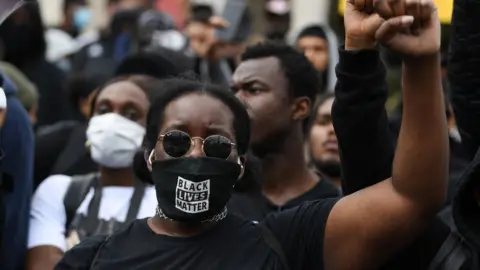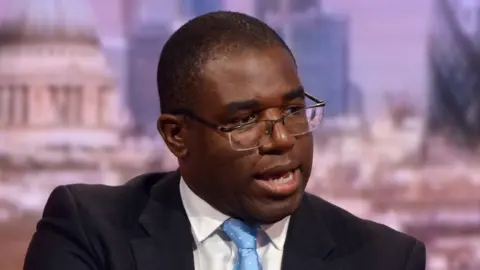Black Lives Matter: Have racial inequality reviews led to action?
 EPA
EPAPrime Minister Boris Johnson has announced he will set up a new commission to look at all "aspects of inequality."
However, David Lammy, the shadow justice secretary, has criticised the plan for a Commission on Race and Ethnic Disparities. He said the government should focus instead on implementing recommendations from existing reviews.
So, what has already been said about race and inequality, and have previous reviews led to government action?
Windrush Review (2020)
In 2018, Wendy Williams, a prominent member of the police watchdog body, was asked to look into the events leading up to the Windrush scandal, in which a number of people were wrongly deported by the Home Office.
The review, which was published in March this year, made 30 recommendations including:
- the Home Office should set up a full review of the UK's "hostile environment" immigration policy
- appoint a Migrants Commissioner
- develop a programme of cultural change for the department
- establish a race advisory board
The Home Office was asked to publish a "comprehensive improvement plan within six months of the report", taking account of all the recommendations.
On 23 June, Home Secretary Priti Patel announced that the government would be accepting the report's recommendations "in full." She said that details on how they would be implemented would be announced by the end of July.
Lammy Review (2017)
In 2016, David Lammy was asked to lead a government-backed review into the treatment of black and minority ethnic (BAME) individuals in the criminal justice system in England and Wales.
The final report made 35 recommendations, including:
- introducing assessments of young offenders' maturity
- exploring how criminal records could be "sealed" or kept from employers, in particular for young people
- allowing some prosecutions to be deferred
- a new approach to record and publish ethnicity data
On 24 June, the prime minister said that 16 of the recommendations had been met, but Mr Lammy has since written to the prime minister saying that summary contained "a catalogue of falsehoods".
He said just six had actually been implemented and a further five had been partially implemented "at best".
The Ministry of Justice has, in some places, stated that some recommendations have been "completed", even where they have rejected them on cost grounds or feasibility.

For example, one recommendation says that judges should follow an agreed number of cases in the youth justice system to increase their understanding of it. The government says this has been "completed", even though they said "we have no plans to require magistrates to follow an agreed number of individuals cases each year".
They have, however, increased "information sharing" between the youth justice system and magistrates.
They have "completed" their actions, it could be argued, but not necessarily done what was recommended.
In his letter to the prime minister, Mr Lammy says that "many of the injustices I raised in my review have since got worse" with the main cause for concern being the youth justice system.
For example, young BAME individuals represent half of the entire youth justice system.
McGregor-Smith Review (2017)
The McGregor-Smith review looked into issues affecting BAME groups in the workplace in the UK.
It found that they were under-employed and under-promoted.
"In many organisation, the processes, in place, from the point of recruitment through to progression to the very top, remain favourable to a select group of individuals," it said.
- Published, aspirational targets and better data
- Unconscious bias training for all staff and executives
- Providing mentoring and more transparent information on career progression
- Challenging bias, including through more diverse supply chains and interview panels
The government agreed with many of the recommendations, but said it hoped "reasonable employers in the UK will rise to the challenges", leaving it to private companies to implement changes.
On introducing legislation for larger bodies to release diversity data, the government said it believed a "non-legislative solution is the right approach for now".
A 2018 update to the review, including a survey of businesses, found that little had changed in the year since the review, with the exception of increased mentoring.
Angiolini Review (2017)
The Angiolini Review of deaths in police custody found that, while the death rate of black individuals arrested was not disproportionate to white people in England, the proportion of deaths involving use of force was.
It also found that mental health and intoxication was a major factor in deaths in police custody, meaning black people with mental health issues often suffered "double discrimination".
Only a handful of the 110 recommendations were specific to race:
- The police complaints body should explore more regularly whether race and discrimination played a factor
- Mandatory training and refresher training on the nature of discrimination
- Improvement of restraint-related deaths and ethnicity statistics
The government's response or progress update did not make specific reference to deaths in police custody involving minority groups.
However, the Independent Office for Police Conduct noted it had reviewed guidance on handling allegations of discrimination. It has also given a better breakdown of data in the past two years.
Other reviews
Other reports have highlighted institutional discrepancies for BAME groups in the past including:
- Timpson Review (2019): Highlighted that black Caribbean children were 1.7 times more likely to be excluded than white British counterparts.
- Parker Review (2017): Found that just 8% of FTSE100 directors were from BAME groups. It gave eight recommendations, but these were directed at the private sector.
- Macpherson Review (1999): set up in the immediate aftermath of the murder of Stephen Lawrence, it found the Metropolitan Police was "institutionally racist". It's recommendations ranged from increasing data availability to increasing accountability of officers. By it's 10th anniversary, the Home Office said 67 of 70 recommendations had been met or partly met.


